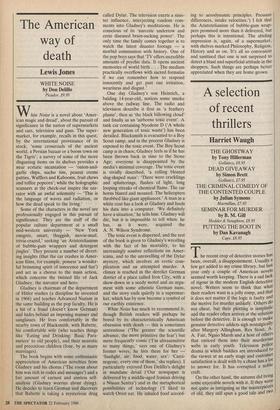The American way of death
Lewis Jones
WHITE NOISE by Don Delillo
Picador, f9.95
White Noise is a novel about 'Amer- ican magic and dread', about the pursuit of significance in the nation of supermarkets and cars, television and guns. The super- market, for example, recalls in this quest, by the international provenance of its stock, 'some crossroads of the ancient world, a Persian bazaar or a boom town on the Tigris'; a survey of some of the more disgusting items on its shelves provides a near ecstatic incantation — 'onion-and- garlic chips, nacho tins, peanut creme patties, Wafflers and Kabooms, fruit chews and toffee popcorn'; while the holographic scanners at the check-out inspire the nar- rator with an awful solemnity — 'This is the language of waves and radiation, or how the dead speak to the living.'
Some of the characters in the novel are professionally engaged in this pursuit of significance. They are the staff of the popular culture department at a small mid-western university — 'New York emigres, smart, thuggish, movie-mad, trivia-crazed,' seeking 'an Aristotelianism of bubble-gum wrappers and detergent jingles'. They present a number of divert- ing insights (that the car crashes in Amer- ican films, for example, possess 'a wonder- ful brimming spirit of innocence and fun') and act as a chorus to the main action, which concerns the twisted life of Jack Gladney, the narrator and hero.
Gladney is chairman of the department of Hitler studies (a discipline he invented in 1968) and teaches Advanced Nazism in the same building as the pop faculty. He is a bit of a fraud (doesn't know German) and hides behind an imposing manner and sunglasses. He lives comfortably in the nearby town of Blacksmith, with Babette, his comfortable wife (who teaches things like 'Eating and Drinking: Basic Para- meters' to old people), and their neurotic and precocious children (four, by as many marriages).
The book begins with some enthusiastic appreciation of American novelties from Gladney and his chorus (`The room about him was rich in codes and messages') and a fair amount of earnest and aimless self- analysis (Gladney worries about dying). He decides to learn German and discovers that Babette is taking a mysterious drug called Dylar. The television exerts a sinis- ter influence, interjecting random com- ments into Gladney's meditations. He is conscious of its 'narcotic undertow and eerie diseased brain-sucking power'. The only time the family comes together is to watch the latest disaster footage — a morbid communion with history. One of the pop boys says that `TV offers incredible amounts of psychic data. It opens ancient memories of world birth . . . The medium practically overflows with sacred formulas if we can remember how to respond innocently and get past our irritation, weariness and disgust.'
One day Gladney's son Heinrich, a balding 14-year-old, notices some smoke above the railway line. The radio and television describe it first as 'a feathery plume', then as 'the black billowing cloud' and finally as an 'airborne toxic event'. A tank car containing Nyodene D CA whole new generation of toxic waste') has been derailed. Blacksmith is evacuated to a Boy Scout camp, and in the process Gladney is exposed to the toxic event. The Boy Scout camp is in chaos; Gladney feels as if he has been thrown back in time to the Stone Age; everyone is disappointed by the media's minimal coverage. The toxic event is vividly described, 'a rolling bloated slug-shaped mass': 'There were cracklings and splutterings, flashes of light, long looping streaks of chemical flame. The car horns blared and moaned. The helicopters throbbed like giant appliances.' A man in a white coat has a look at Gladney and feeds his data into a computer. 'We definitely have a situation,' he tells him. Gladney will die, but it is impossible to tell when: he has, as it were, acquired the A. N. Wilson Syndrome.
The toxic event is dispersed, and the rest of the book is given to Gladney's wrestling with the fact of his mortality, to his increasingly sombre reflections on Amer- icana, and to the unravelling of the Dylar mystery, which involves an erotic com- plication and an attempted murder. A climax is reached in the derelict German district of a place called Iron City, with a show-down in a seedy motel and an argu- ment with some atheistic German nuns, and the story ends quietly in a supermar- ket, which has by now become a symbol of our earthly existence.
White Noise has much to recommend it, though British readers will perhaps be bored by its characteristically American obsession with death — this is sometimes sententious (The greater the scientific advance, the more primitive the fear') but more frequently comic (`I'm ultrasensitive to many things,' says one of Gladney's former wives; he lists them for her 'Sunlight, air, food, water, sex': 'Carci- nogenic, every one of them,' she replies). I particularly enjoyed Don Delillo's delight in mundane detail (`Our newspaper is delivered by a middle-aged Iranian driving a Nissan Sentra') and in the metaphorical possibilities of technology CI liked to watch Orest eat. He inhaled food accord- ing to aerodynamic principles. Pressure differences, intake velocities.') I felt that the Aristotelianism of bubble-gum wrap- pers promised more than it delivered, but perhaps this is intentional. The abiding impression is, again, of a supermarket, with shelves marked Philosophy, Religion, History and so on. It's all so convenient and sanitised that one is not surprised to detect a blasé and superficial attitude in the shoppers. Such things are perhaps better appreciated when they are home grown.














































 Previous page
Previous page